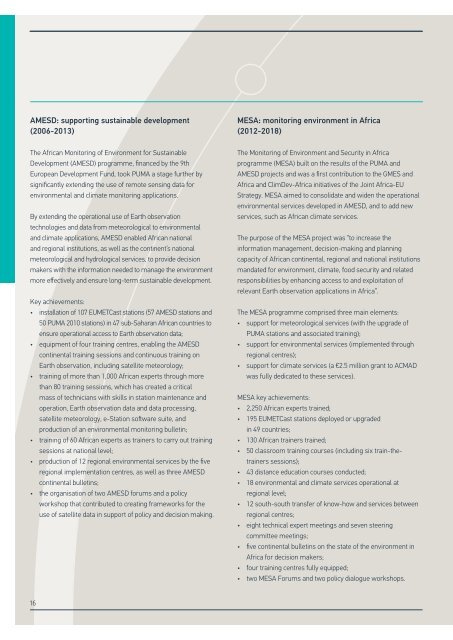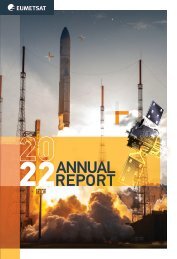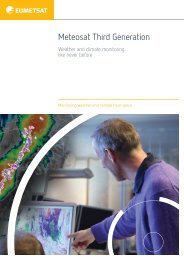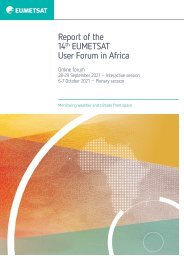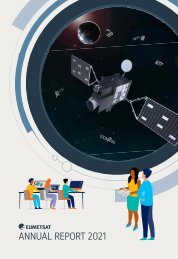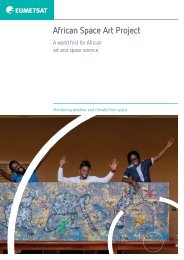EUMETSAT and Africa
European meteorological satellites at the service of Africa
European meteorological satellites at the service of Africa
- No tags were found...
Create successful ePaper yourself
Turn your PDF publications into a flip-book with our unique Google optimized e-Paper software.
AMESD: supporting sustainable development<br />
(2006-2013)<br />
MESA: monitoring environment in <strong>Africa</strong><br />
(2012-2018)<br />
The <strong>Africa</strong>n Monitoring of Environment for Sustainable<br />
Development (AMESD) programme, financed by the 9th<br />
European Development Fund, took PUMA a stage further by<br />
significantly extending the use of remote sensing data for<br />
environmental <strong>and</strong> climate monitoring applications.<br />
By extending the operational use of Earth observation<br />
technologies <strong>and</strong> data from meteorological to environmental<br />
<strong>and</strong> climate applications, AMESD enabled <strong>Africa</strong>n national<br />
<strong>and</strong> regional institutions, as well as the continent’s national<br />
meteorological <strong>and</strong> hydrological services, to provide decision<br />
makers with the information needed to manage the environment<br />
more effectively <strong>and</strong> ensure long-term sustainable development.<br />
Key achievements:<br />
• installation of 107 EUMETCast stations (57 AMESD stations <strong>and</strong><br />
50 PUMA 2010 stations) in 47 sub-Saharan <strong>Africa</strong>n countries to<br />
ensure operational access to Earth observation data;<br />
• equipment of four training centres, enabling the AMESD<br />
continental training sessions <strong>and</strong> continuous training on<br />
Earth observation, including satellite meteorology;<br />
• training of more than 1,000 <strong>Africa</strong>n experts through more<br />
than 80 training sessions, which has created a critical<br />
mass of technicians with skills in station maintenance <strong>and</strong><br />
operation, Earth observation data <strong>and</strong> data processing,<br />
satellite meteorology, e-Station software suite, <strong>and</strong><br />
production of an environmental monitoring bulletin;<br />
• training of 60 <strong>Africa</strong>n experts as trainers to carry out training<br />
sessions at national level;<br />
• production of 12 regional environmental services by the five<br />
regional implementation centres, as well as three AMESD<br />
continental bulletins;<br />
• the organisation of two AMESD forums <strong>and</strong> a policy<br />
workshop that contributed to creating frameworks for the<br />
use of satellite data in support of policy <strong>and</strong> decision making.<br />
The Monitoring of Environment <strong>and</strong> Security in <strong>Africa</strong><br />
programme (MESA) built on the results of the PUMA <strong>and</strong><br />
AMESD projects <strong>and</strong> was a first contribution to the GMES <strong>and</strong><br />
<strong>Africa</strong> <strong>and</strong> ClimDev-<strong>Africa</strong> initiatives of the Joint <strong>Africa</strong>-EU<br />
Strategy. MESA aimed to consolidate <strong>and</strong> widen the operational<br />
environmental services developed in AMESD, <strong>and</strong> to add new<br />
services, such as <strong>Africa</strong>n climate services.<br />
The purpose of the MESA project was “to increase the<br />
information management, decision-making <strong>and</strong> planning<br />
capacity of <strong>Africa</strong>n continental, regional <strong>and</strong> national institutions<br />
m<strong>and</strong>ated for environment, climate, food security <strong>and</strong> related<br />
responsibilities by enhancing access to <strong>and</strong> exploitation of<br />
relevant Earth observation applications in <strong>Africa</strong>”.<br />
The MESA programme comprised three main elements:<br />
• support for meteorological services (with the upgrade of<br />
PUMA stations <strong>and</strong> associated training);<br />
• support for environmental services (implemented through<br />
regional centres);<br />
• support for climate services (a €2.5 million grant to ACMAD<br />
was fully dedicated to these services).<br />
MESA key achievements:<br />
• 2,250 <strong>Africa</strong>n experts trained;<br />
• 195 EUMETCast stations deployed or upgraded<br />
in 49 countries;<br />
• 130 <strong>Africa</strong>n trainers trained;<br />
• 50 classroom training courses (including six train-thetrainers<br />
sessions);<br />
• 43 distance education courses conducted;<br />
• 18 environmental <strong>and</strong> climate services operational at<br />
regional level;<br />
• 12 south-south transfer of know-how <strong>and</strong> services between<br />
regional centres;<br />
• eight technical expert meetings <strong>and</strong> seven steering<br />
committee meetings;<br />
• five continental bulletins on the state of the environment in<br />
<strong>Africa</strong> for decision makers;<br />
• four training centres fully equipped;<br />
• two MESA Forums <strong>and</strong> two policy dialogue workshops.<br />
16


